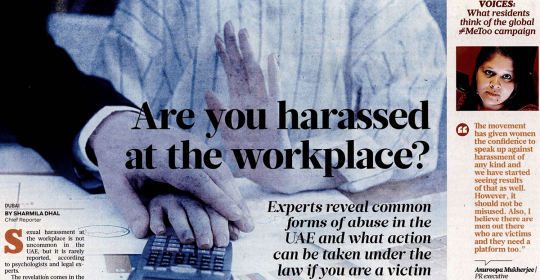
Workplace Harassment In The UAE – Dr. Fabian Explains The Psychology Behind It – Gulf News
Experts reveal common forms of abuse in UAE and what action can be taken by victims
Dubai: Sexual harassment at the workplace is not uncommon in the UAE, but it is rarely reported, according to psychologists and legal experts.
The revelation comes in the wake of fresh allegations being made globally as part of the #MeToo campaign against sexual harassment. […]
How sexual harassment can affect a victim
Sexual harassment breaks down a person’s sense of safety and security, especially if it happens in an environment or relationship considered “safe”.
He said victims will show some fight-or-flight behaviours, which may involve avoidance or startle reactions. “It may also lead to freeze-reactions and panic attacks. Helplessness, sadness and guilt/shame about what happened, anger towards the perpetrator and self, and anxiety about the future characterise post-traumatic reactions.”
Dr Sarloos said people also fear the occupational and social consequences of the trauma and isolate themselves. Sleeping problems and nightmares may lead to people feeling exhausted during the day. Relationships with others may also change.
“The longer people suppress or shy away from addressing the trauma, the more likely it is to affect overall functioning, which may lead to other psychological problems such as depression or burnout, or occupational/social problems such as making mistakes or losing one’s job. In some cases, it could also lead to cardiovascular problems.”
What help can one expect from a psychologist?
Dr Sarloos said psychologists provide various forms of psychotherapy, depending on the victim’s individual characteristics, needs, state of trauma and preferences. “Psychotherapy focuses on breaking avoidance and addressing the trauma, installing rational and functional interpretations to the trauma in order for the brain to re-process the event, but with a more adaptive perspective.”
He said cognitive behaviour therapy is the most effective as it focuses on changing the thoughts underlying the traumatic experience. “Eye-Movement Desensitisation Reprocessing is another form of therapy, in which the brain is stimulated in such a way that emotions can be reprocessed in a more functional memory that can be stored long-term.”
Psychiatrists also prescribe anti-depressants or anti-anxiolytics if necessary, he added.
The original full article was published in Gulf News

